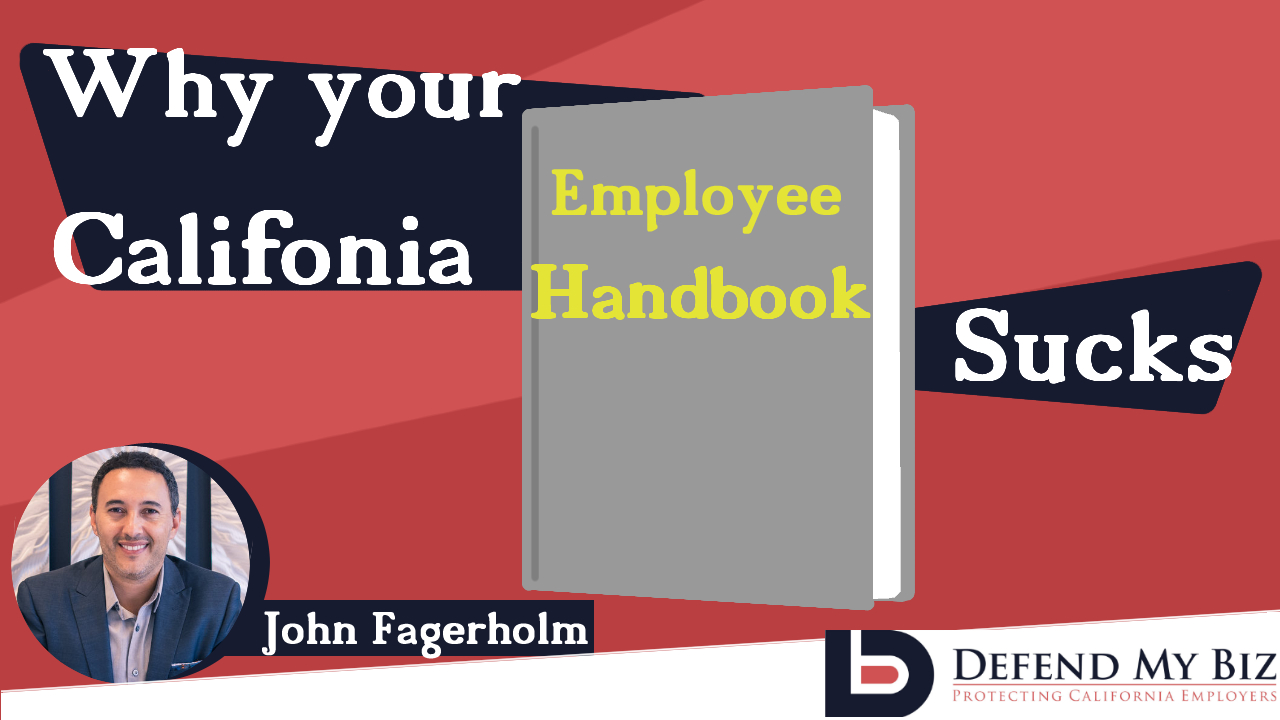
Posted on April 9th, 2019
Below is a complete transcript of the video.
What’s up fellow entrepreneurs. It’s John Fagerholm again from Defend My Biz.
Today I wanna talk about employment handbooks in California, and why employment handbooks suck.
First, let me start out by saying, the law doesn’t require you to have employee handbooks.
However, I think employee handbooks suck but better to have one that not have one. So, that being said, let me explain why I think they suck.
First of all, they just don’t work in the way that you think they’re going to work for you.
What typically happens is people will spend a ton of money, five to ten grand for an employment handbook that’s forty-something pages and then they just think that covers them for however long it’s supposed to cover them.
What people don’t realize is the employment laws change in California roughly every six months, and there’s usually a significant change at least once a year that requires you to change something in your handbook.
So unless you’re spending five, ten grand a year for a handbook, you’re probably not up to date six months to a year after you’ve purchased this thing.
That’s reason number one, just the expense and that you’re updated … not updated.
Reason number two handbooks suck is that typically they’re a combination of legal policies and company policies.
On one hand, the legal policies, things you can get sued for like overtime, lunch breaks, meal breaks, things like that.
Then there’s usually some sort of company policy like smoke breaks are here, work hours are here, things like that.
What I’ve noticed is, especially for larger companies, is that you’ll find these attorneys that will get a hold of one of these employee handbooks and then they’ll loof conflicts because typically there may be conflicts between the company policies, especially if you’re continuously changing it versus the policies, the portion of the handbook that has the legal policies.
The final reason why I find handbooks to be deficient and suck is that they just don’t work for what you think they’re going to work for.
For example, in every deposition that I’ve taken, and even some trials, I think one or two trials where I had to use the employment handbook, it just didn’t work the way I wanted it to work.
For example, in one particular case, this employee claimed that he worked all of these hours overtime, but the employee handbook specifically states these are the work hours, no overtime without the specific permission of a particular supervisor.
When I was deposing this employee that was suing the employer, I basically presented the handbook, and I said, “Do you recognize this handbook?” The employee says, “Yes,” and then I say, “Look at the back. Is that your signature?” And they go, “Yes,” and I say, “All right. Turn to page,” I don’t know what it was, “36.
Do you see this clause about no overtime without permission from the supervisor?” And the employee basically said what they all say every single time I’ve asked questions around the handbook, which is we didn’t read it. It was handed to us and we signed the back of it and that’s it.
I found the one or two times that I had to use it in front of the jury, the jury absolutely believes that. They believe that the employee didn’t read the handbook because they probably didn’t read their handbooks when it was given to them by their employer.
All that being said, that’s why I think handbooks suck. But, it’s certainly better than nothing, and I think a better option is very specific policies for each thing, and here’s what I mean by that. What we do instead of a handbook, which we used to do probably … I think the last handbook I drafted was probably five, six years ago.
Now we do a very specific one or two-page policy for everything you can be sued for in California law. Over time, meal breaks, sexual harassment, you name it.
Those one or two policies are written as a contract between the employee and the employer, so it’s not just, “Here’s a bunch of information on the page,” it’s actual obligations for the employee also.
For example, going back to the overtime example, it’ll state what overtime is, and then it gives the obligation to the employee, something like, “I warrant and represent that I won’t work any overtime without notifying this specific supervisor,” and then it’s on one page, both in English and in Spanish, signature at the bottom.
Then if I were to go to that same employee and I were to say, “Do you recognize this document and is that your signature and do you recognize this particular clause,” it’s more believable. It’s a lot less believable to say, “I didn’t even read this one page,” than it is to say, “Well, I didn’t read 48 pages.” So that’s why we do it that way.
Anyway, again, better than nothing but I don’t think it’s the best thing.
Thanks, everybody. Until next time.


